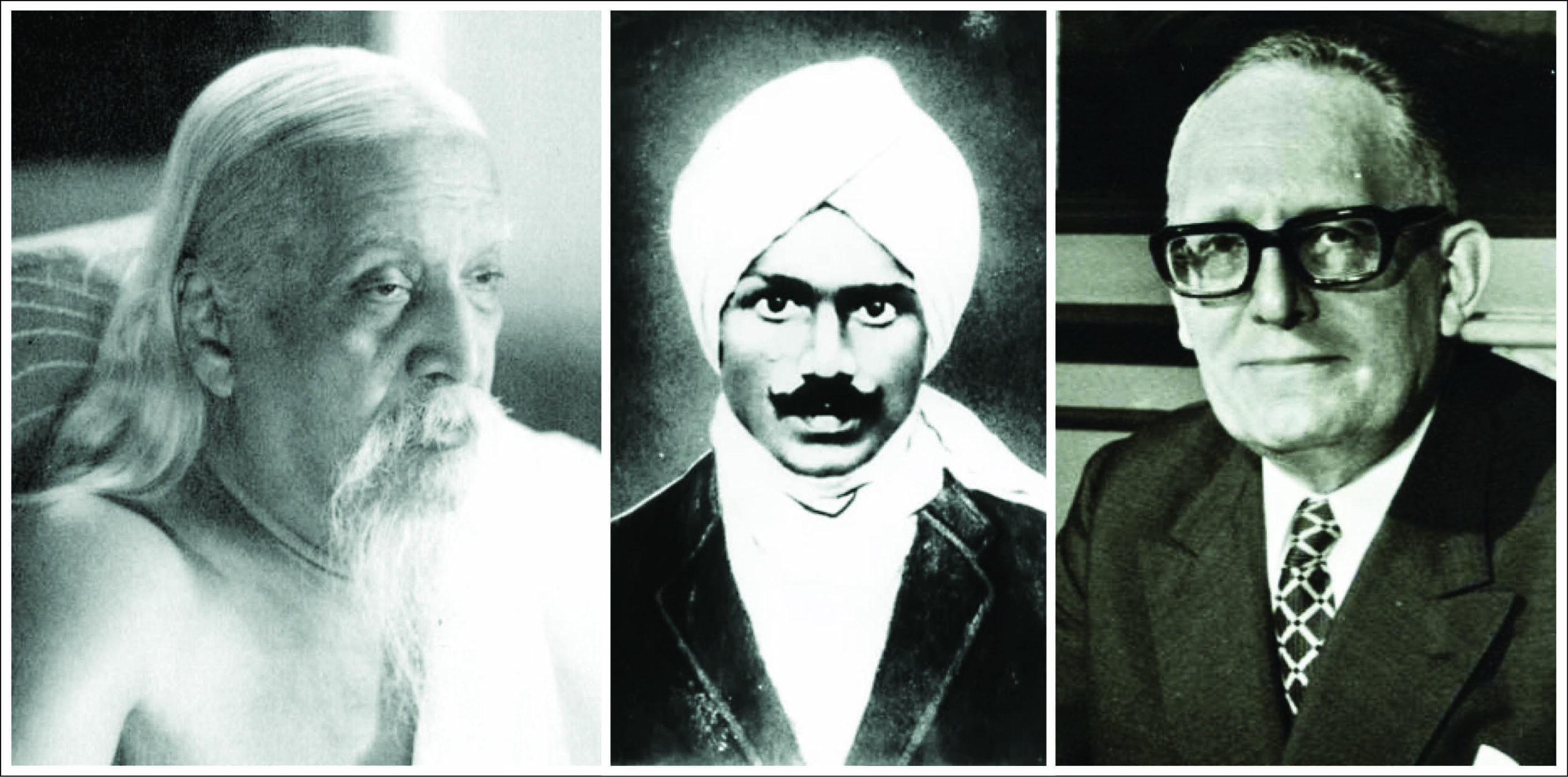Cave of Tapasya
- By : Anirban Ganguly
- Category : Articles

Prime Minister Narendra Modi’s visit to France comes at an interesting and symbolic time of confluence in India’s history. While India and France are celebrating 75 years of their diplomatic relations, India is celebrating the 75th year of her independence and is also commemorating the 150th birth anniversary of one of her most global and powerful philosophers and sages, Sri Aurobindo, who had made the then French enclave of Pondicherry, his seat of refuge, “cave of Tapasya” for four decades. As one of Sri Aurobindo’s most poetic biographers, KR Srinivasa Iyengar, described it, “Sri Aurobindo chose Pondicherry as his “Cave of Tapasya”, because it was then a French territory, removed further away from Calcutta than Chandernagore, and was yet part of the Indian subcontinent, a living cell of the Mother India who had inspired millions of her children to sing the soul-stirring anthem, “Bande Mataram!”
A well-known personality and patriot of the region, KV Rangaswami Iyengar, had been told by his Guru Nagai Japata of Thanjavur, at the time of his passing, that “a Yogi from the North – Uttara Yogi – would one day come to the South. Rangaswami recognised in Sri Aurobindo, his Guru’s “Uttara Yogi.” To the British Indian administration around 1909, Sri Aurobindo came across as the only nationalist with a pan-India stature who still held out, while most of his compatriots such as Lokmanya Tilak, Bipin Chandra Pal, Aswini Kumar Dutt, Lala Lajpat Rai had either been deported, interned or sent into exile.
Sri Aurobindo continued to be the master of the game of revolution, the “ring-leader” who eluded their net. Andrew Fraser, then Lieutenant Governor of Bengal, in his report to the Governor General, had written earlier, “He is the ring leader. He is able, cunning, fanatical…He is regarded and spoken of by all as the disciples regard their Master…But he has kept himself, like a careful and valued General, out of sight of the “enemy.” For the British thus, a “man as dangerous as Arabinda Ghose”, wrote historian MN Das in his opus, “India under Morley and Minto”, “should not be allowed to remain at large.”
Had it perhaps not been for France and for successive French governments, administrators and governors from 1910 onwards, who prevented and circumvented numerous efforts and pressures exerted by the British to deport him, Sri Aurobindo would have been sent into exile to one of those remote British enclaves either in Africa or the Far East. Providence there was, and it was France’s lot in the twentieth century, as far Sri Aurobindo was concerned, to become the agency, the instrument through which Providence ensured that the sage was allowed, undisturbed, to continue with his sadhana, his contemplation and with his action of rekindling the narrative, the vision and aspiration of India as the spiritual leader and teacher of the world.
For years the British intelligence tried to get hold of Sri Aurobindo. There were several attempts to even get him kidnapped. One story goes that seditious literature was planted, through a ruse, in the well of the house in which he then lived. When the planted consignment was unearthed Sri Aurobindo asked that the police be informed. The investigating magistrate, M Nandot, a Frenchman, who came with the Police Chief of Pondicherry, was so impressed with Sri Aurobindo’s vast collection of books and papers in Greek and Latin, all scattered around, that he was convinced that a person who was steeped in Greek and Latin could never indulge in illegal acts. Nandot exclaimed, “Il sait du latin, Il sait du grec” (“He knows Latin, he knows Greek!”) and left, “the prosecutors became friends and admirers.” The trouble, wrote Srinivasa Iyengar, “was not with the French, but with the British spies in Pondicherry and the British authorities in India. For the French, Sri Aurobindo was an honoured political exile, entitled to their protection.”
The British tried other means as well. Word was sent that the British Government of India would “be pleased to grant him asylum at a secluded and salubrious hill-resort like Darjeeling to pursue his Yoga in complete freedom” and that Lord Carmichael, then Governor of Bengal “himself would like to discuss philosophy with him.” Sri Aurobindo dismissed it as “ointment to catch a fly.” There was talk of the British having convinced the French to offer him “safe passage” to Algeria where he could live in peace with his chosen disciples. Some of his co-revolutionaries in Pondicherry dithered for a while wondering whether it would not, after all, be a good idea, to move out of India and shift base to Djibouti, Tripoli, or French Indochina? But Sri Aurobindo “was firm. He wouldn’t by himself move out of Pondicherry. That was his chosen place – or God directed sanctuary – for continuing the work…that was his Gaya where he would one day complete his siddhi…”
British ingenuity surpassed all efforts of the past, when in a final attempt of sorts to nab Sri Aurobindo, they made an “attempt to exchange France’s Indian possessions”, especially Pondicherry, “for certain areas in the West Indies.” It is said that the Mother’s (Mirra Alfassa), who was Sri Aurobindo’s foremost and most revered collaborator, brother, Matteo Alfassa, a formidable administrator in the French administration, an intellect and man of public activity of great standing, sometime governor-general of French Equatorial Africa, got the move scuttled from Paris. The Raymond Poincaré administration, between 1913 and 1920, thus “firmly decided against the proposal. Pondicherry remained French, and Sri Aurobindo continued his tapasya there.”
Sri Aurobindo’s constant companions in those early days in Pondicherry were Tamil revolutionaries and thinkers such as Mahakavi Subramania Bharati, Srinivasachariar, Subramania Siva, Nagaswami Aiyar and VVS Aiyar – a close associate of Veer Savarkar. Well-known Indian French citizens of Pondicherry too provided him protection and succour and rallied around him whenever the need arose. It was after the successful resistance to one such major attempt to dislodge Sri Aurobindo from Pondicherry, that Mahakavi Subramania Bharati composed his fiery “Jayam Undu” (Victory is Sure), “Fear not heart! Victory is sure! Freedom is ours, here and now! The mighty Mother lodges in my heart…”
It was because of Sri Aurobindo’s presence and the profound respect that the French administration and French intelligentsia held for him that transfer of French enclaves to India was smoothly done. The Governor of French India, at the time of independence, Francois Baron, for instance, considered himself a disciple of Sri Aurobindo. Two encounters had transformed Baron’s life, “he had become a man of action because he met [General] Gaulle; and he became a mystic and thinker because he met Sri Aurobindo.”
The legendary French statesman and war hero Maurice Schumann (1911-1998), later French foreign minister under Georges Pompidou, sometime minister for scientific research and social affairs, a close collaborator of General De Gaulle in the French Resistance movement, known as the “Voice of France” for his inspiring broadcast from exile, referred to as “the most European of the Gaullists and the most Gaullist of the Europeans”, writer and thinker, later Member of the Académie Française, called on Sri Aurobindo in September 1947. Schumann was sent as a special envoy of French Prime Minister Paul Ramadier to meet Sri Aurobindo and to explore the possibilities of setting up a special cultural institute or university in Pondicherry as a confluence of Indian and French culture and also to discuss the transition.
Sri Aurobindo, who himself spoke French well, granted an audience to Schumann, with the Mother playing a crucial role. An AFP report on the meeting noted, “Sri Aurobindo, the most powerful Indian thinker, interrupted his confinement which started 21 years ago to receive Governor Baron and Mr. Maurice Schumann…Once only, 19 years ago, Sri Aurobindo interrupted his confinement to talk with the poet Rabindranath Tagore. He had with Governor Baron and Mr. Schumann a 45 minute-meeting, during which he declared: “France, after India, is the country for which I have the most fondness and respect.” Sri Aurobindo assured Schumann of “his full support” for the proposal “as a permanent meeting place between France and India.”
His meeting with Sri Aurobindo being widely reported, Schumann was received by Mahatma Gandhi and later Nehru, leading to the gradual and peaceful merger of the French enclaves. Of Schumann, one of Sri Aurobindo’s leading French disciples Philippe Barbier Saint Hilaire – Pavitra – was to write, “C’est un homme ouvert et intelligent, capable de comprendre let but de Sri Aurobindo…certainement large d’idées, un peu politicien déjà, mais idéaliste tout de même.” (He is a man who is open and intelligent, capable of understanding Sri Aurobindo’s goal, wide with ideas, already a bit of a politician, but an idealist, all the same).
His meeting with Sri Aurobindo led Schumann to convene a conference in Pondicherry of the French representatives of the five enclaves, which relayed the following message, in Schumann’s words: “We salute Independent India. We know perfectly well that the whole of India will one day be independent. We would like that the departure of France as a power and as an authority should coincide with an agreement regarding Pondicherry which would become a window open to France, to the whole French entity, French culture, and the French language.” This was in stark contrast to Portugal’s attitude towards her Indian colony.
Of his meeting with Sri Aurobindo, Schumann would recall decades later, “The extraordinary radiance of the divine life, the Life Divine. The radiance that was there on his face. I always thought that faith manifested as a breath. One feels, in certain circumstances, the Breath of God – Spiritus – it means ‘breath’, and felt it as soon as I saw him. One had the impression – there was no artificial light falling on him – one had the impression that he was himself a radiant centre.”
As Prime Minister Modi visits Paris this significant year, it will be, in a sense, a reiteration of that special bond, that symbolic past, and the memory of that “radiant centre”, inspiring the civilisational partnership between our two nations.

















